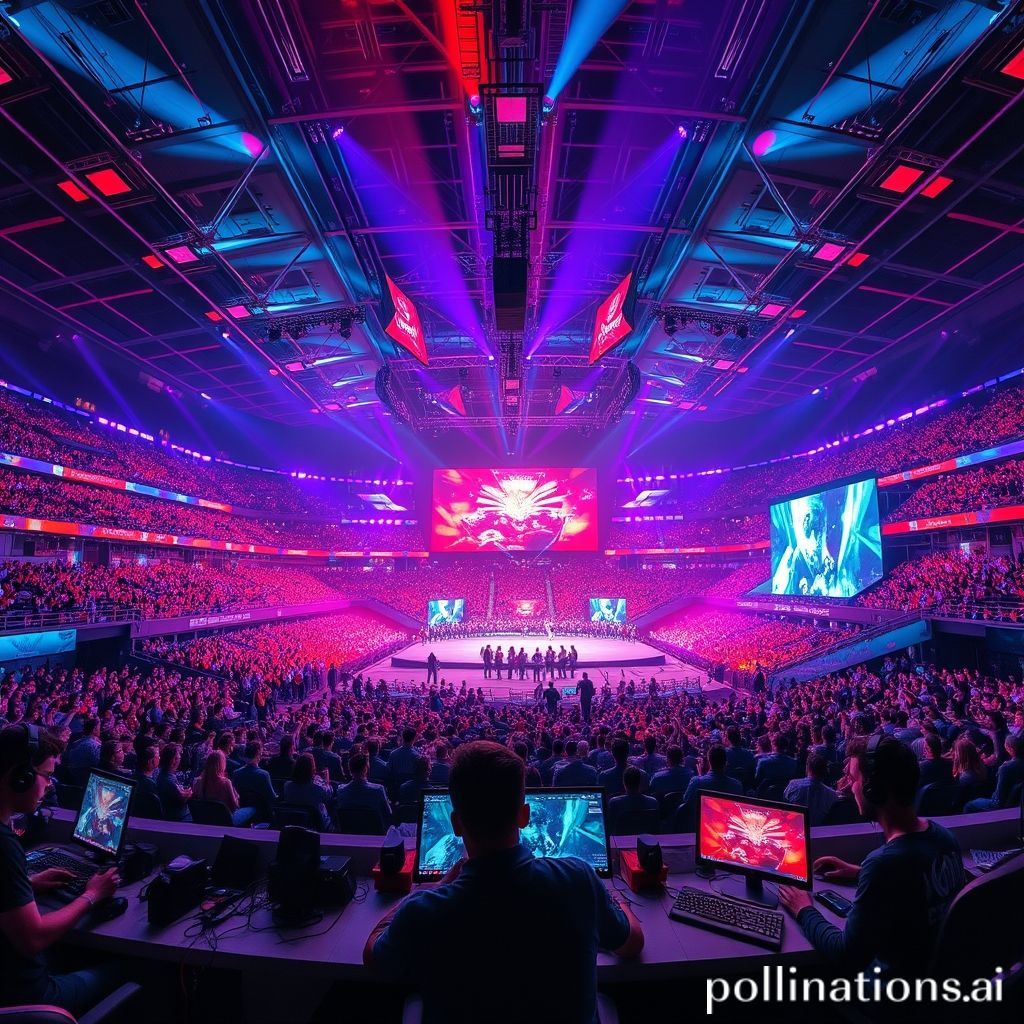
Esports: Competitive Gaming’s Industry Revolution
Remember when video games were just a pastime, confined to arcades and living rooms? Fast forward to today, and you’ll find packed arenas, multi-million dollar prize pools, and professional athletes competing in what has become a global phenomenon: esports. The rise of competitive gaming isn’t just a trend; it’s a seismic shift that has profoundly impacted the entire gaming industry, transforming how games are developed, marketed, and consumed. Let’s dive deep into this electrifying world and explore how esports is truly revolutionizing the gaming landscape.
The Genesis of a Global Phenomenon
While competitive gaming has roots stretching back to the early days of arcade high scores, the modern era of esports truly began to take shape with the advent of accessible internet and multiplayer online games. What started as informal competitions among friends quickly escalated into organized tournaments, attracting dedicated players and a growing audience.
From Arcades to Arenas: A Brief History
Early competitive scenes were often grassroots, driven by passionate communities around games like *StarCraft: Brood War*, *Counter-Strike 1.6*, and *Quake*. These games fostered intense rivalries and demonstrated the strategic depth and skill ceiling that could captivate an audience. As internet speeds improved and streaming platforms like Twitch emerged, the ability for anyone, anywhere, to watch professional matches exploded. This accessibility was a game-changer, turning niche events into mainstream entertainment.
The Rise of Professional Players and Teams
With increasing viewership came larger prize pools and the professionalization of the players themselves. What was once a hobby became a viable career path. Today, esports organizations operate like traditional sports franchises, complete with coaches, analysts, managers, and dedicated training facilities. Players undergo rigorous practice schedules, focusing on mechanical skill, strategic understanding, and team coordination, pushing the boundaries of human reaction time and tactical execution. They are celebrated figures, with fan bases that rival those of traditional athletes, signing lucrative endorsement deals and commanding significant salaries.
Reshaping the Gaming Industry Landscape
The impact of esports extends far beyond the competitive scene itself. It has fundamentally altered how game developers approach their craft, how publishers monetize their titles, and how the broader industry perceives the value of gaming.
Game Development and Design: Esports-First Approach
For many developers, designing a game with esports in mind is no longer an afterthought but a core philosophy. This “esports-first” approach influences everything from game balance and character design to user interface and spectator modes. Games like *League of Legends*, *Dota 2*, *Valorant*, and *Overwatch* are meticulously balanced with competitive integrity at their core, ensuring fair play and exciting viewership. Developers invest heavily in features that enhance the spectator experience, such as replay systems, observer tools, and detailed statistics, making it easier for casters and analysts to tell compelling stories.
The longevity of an esports title is also a key consideration. Developers continually update and refine their games, introducing new content and balancing patches to keep the meta fresh and engaging for both players and viewers. This commitment to ongoing support fosters a loyal community and extends the game’s lifespan far beyond what traditional single-player titles might achieve.

Revenue Streams Beyond Game Sales
Esports has opened up a plethora of new revenue streams that diversify the gaming industry’s traditional reliance on initial game sales. These channels contribute significantly to the ecosystem’s growth and sustainability:
- Sponsorships and Advertising: Brands from various sectors, including automotive, technology, energy drinks, and fashion, are flocking to esports. They see the immense marketing potential in reaching a young, tech-savvy, and highly engaged audience. Team jerseys, arena signage, and in-stream ads are now common sights, bringing substantial investment into the scene.
- Media Rights and Broadcasting: Just like traditional sports, media companies are acquiring broadcasting rights for major esports leagues and tournaments. Platforms like Twitch, YouTube Gaming, and even traditional television networks are paying premiums to stream live matches, further legitimizing esports as a mainstream entertainment product.
- Merchandise and Ticketing: Fans eagerly purchase team jerseys, apparel, and branded peripherals, showcasing their allegiance. Live events, ranging from regional qualifiers to global championships, sell out massive arenas, with ticket sales contributing significantly to event revenue.
- In-game Purchases and Battle Passes: Many free-to-play esports titles generate revenue through cosmetic in-game items (skins, emotes) and battle passes. These items allow players to personalize their experience without affecting gameplay, creating a robust economy that directly supports the game’s development and the esports ecosystem.
A New Era for Players and Fans
Esports has not only created new avenues for industry revenue but also forged unique connections between players, teams, and their global fan bases, fostering a vibrant and dedicated community.
Professional Pathways and Career Opportunities
The rise of esports has created an entirely new professional landscape. Beyond the pro players themselves, there are now thriving careers in coaching, casting (commentary), analytics, event management, broadcasting production, marketing, and even sports psychology tailored for esports athletes. Universities are offering esports scholarships and degree programs, recognizing the legitimacy and growth potential of the industry. This creates a powerful pipeline of talent and expertise, further cementing esports as a legitimate career choice.

Community Building and Fan Engagement
The passionate fan base is the lifeblood of esports. Communities form around specific games, teams, and players, fostering a sense of belonging and shared excitement. Online forums, social media, and live stream chats buzz with discussions, analyses, and celebrations. Esports events are not just about watching a game; they are communal experiences, bringing together thousands of like-minded individuals to cheer for their heroes, share in victories, and commiserate in defeats. The interactive nature of streaming platforms allows fans to directly engage with players and casters, creating a level of intimacy rarely seen in traditional sports.
Technological Advancements and Innovation
Esports acts as a powerful catalyst for technological innovation, pushing the boundaries of hardware, software, and broadcasting technology.
Driving Hardware and Software Evolution
The demand for peak performance in competitive gaming drives innovation in PC hardware (processors, graphics cards, RAM), peripherals (high refresh rate monitors, precision mice, mechanical keyboards), and network infrastructure. Manufacturers constantly strive to reduce latency, increase responsiveness, and enhance visual fidelity to meet the exacting standards of professional players and provide the best possible experience for viewers. Software developers, too, are pushed to create more robust, stable, and feature-rich game engines and tools.
The Future of Spectator Experience
Esports is at the forefront of exploring new ways to consume entertainment. Virtual reality (VR) and augmented reality (AR) are being experimented with to offer immersive viewing experiences, allowing fans to feel like they’re right inside the game or on stage. Interactive overlays on streams provide real-time statistics, player perspectives, and community polls, deepening engagement. The blend of traditional sports broadcasting techniques with innovative digital features ensures that the esports viewing experience remains fresh, dynamic, and incredibly engaging.

Conclusion
The impact of esports on the gaming industry has been nothing short of revolutionary. It has transformed games from simple entertainment into professional sports, created entirely new economies and career paths, and pushed the boundaries of technological innovation. From influencing game design to forging deep community bonds, competitive gaming has cemented its place as a cornerstone of modern entertainment. As technology continues to evolve and global viewership expands, esports is poised for even greater heights, promising an exciting future where the lines between gaming, sport, and entertainment become increasingly blurred. The revolution is here, and it’s exhilarating to be a part of it.


